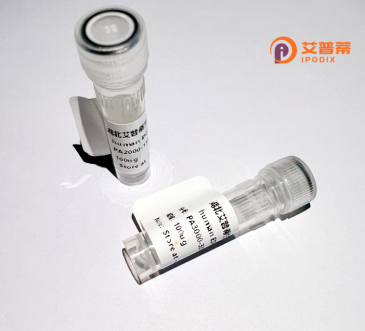
| 纯度 | >90%SDS-PAGE. |
| 种属 | Human |
| 靶点 | ESRRG |
| Uniprot No | P62508 |
| 内毒素 | < 0.01EU/μg |
| 表达宿主 | E.coli |
| 表达区间 | 1-442aa |
| 氨基酸序列 | MSNKDRHIDSSCSSFIKTEPSSPASLTDSVNHHSPGGSSDASGSYSSTMNGHQNGLDSPPLYPSAPILGGSGPVRKLYDDCSSTIVEDPQTKCEYMLNSMPKRLCLVCGDIASGYHYGVASCEACKAFFKRTIQGNIEYSCPATNECEITKRRRKSCQACRFMKCLKVGMLKEGVRLDRVRGGRQKYKRRIDAENSPYLNPQLVQPAKKPLLWSDPADNKIVSHLLVAEPEKIYAMPDPTAPDSDIKALTTLCDLADRELVVIIGWAKHIPGFSTLSLADQMSLLQSAWMEILILGVVYRSLSFEDELVYADDYIMDEDQSKLAGLLDLNNAILQLVKKYKSMKLEKEEFVTLKAIALANSDSMHIEDVEAVQKLQDVLHEALQDYEAGQHMEDPRRAGKMLMTLPLLRQTSTKAVQHFYNIKLEGKVPMHKLLLEMLEAKV |
| 分子量 | 74.36 kDa |
| 蛋白标签 | GST-tag at N-terminal |
| 缓冲液 | 0 |
| 稳定性 & 储存条件 | Lyophilized protein should be stored at ≤ -20°C, stable for one year after receipt. Reconstituted protein solution can be stored at 2-8°C for 2-7 days. Aliquots of reconstituted samples are stable at ≤ -20°C for 3 months. |
| 复溶 | Always centrifuge tubes before opening.Do not mix by vortex or pipetting. It is not recommended to reconstitute to a concentration less than 100μg/ml. Dissolve the lyophilized protein in distilled water. Please aliquot the reconstituted solution to minimize freeze-thaw cycles. |
以下是与重组人ESRRG蛋白相关的3篇参考文献示例:
1. **文献名称**:Structural insights into the agonist effect on ESRRG by crystal structure analysis
**作者**:Zhang Y, et al.
**摘要**:解析了人源ESRRG蛋白与配体结合的晶体结构,揭示了其配体结合域构象变化,为靶向ESRRG的药物设计提供结构基础。
2. **文献名称**:Recombinant human ESRRG protein production and purification for functional studies
**作者**:Lee S, Kim JH.
**摘要**:报道了一种高效的重组ESRRG蛋白表达纯化方法(大肠杆菌系统),验证其体外转录激活活性,适用于后续生化与分子互作研究。
3. **文献名称**:ESRRG regulates cellular metabolism via interaction with PGC-1α in human cells
**作者**:Smith RJ, et al.
**摘要**:通过体外实验(使用重组ESRRG蛋白)证明其与共激活因子PGC-1α结合后,调控线粒体生物合成及糖代谢相关基因的表达。
The human estrogen-related receptor gamma (ESRRG), a member of the nuclear receptor superfamily, functions as a transcription factor regulating genes involved in mitochondrial biogenesis, energy metabolism, and cellular differentiation. Unlike classical estrogen receptors, ESRRG does not bind natural estrogens but shares structural homology, featuring DNA-binding and ligand-binding domains. It acts as an orphan receptor, as its endogenous ligand remains unidentified, though it is constitutively active or modulated by synthetic ligands. ESRRG plays critical roles in maintaining metabolic homeostasis, particularly in tissues with high energy demands such as the heart, brain, and skeletal muscle. Dysregulation of ESRRG has been linked to metabolic disorders, neurodegenerative diseases, and cancers, highlighting its therapeutic potential.
Recombinant human ESRRG protein is produced using heterologous expression systems (e.g., *E. coli* or mammalian cells) with tags (e.g., His or GST) for purification and detection. This engineered protein enables *in vitro* studies on ESRRG’s molecular interactions, DNA-binding activity, and co-regulator recruitment. Researchers utilize it to investigate signaling pathways, screen potential ligands, and develop targeted therapies. Its availability accelerates mechanistic studies and drug discovery efforts aimed at modulating ESRRG’s activity in disease contexts, bridging gaps between genetic insights and translational applications.
×